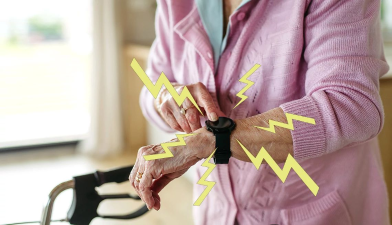If you’ve ever stayed up late worrying about your (senior parent living alone) — wondering if they tripped in the bathroom, or if that chest pain they mentioned last week could happen again — you’re not alone. For millions of adult children (and seniors themselves), that constant “what if?” weighs heavy. But there’s a simple solution that turns anxiety into reassurance: Medical Alert Systems for Seniors. These devices aren’t just “emergency tools” — they’re a way to let your loved ones keep their independence, while giving you both the safety net you need. Let’s break down why they matter, how they work, and what to look for when choosing the right one.

What Are Medical Alert Systems for Seniors — and Why Do They Matter?
At their core, Medical Alert Systems for Seniors are easy-to-use devices that let older adults call for help in seconds, even if they can’t reach a phone. Most look like simple pendants, wristbands, or small portable units — no complicated buttons or apps required. But their real power lies in the peace of mind they bring, for both seniors and their families:
- 24/7 Access to Help, No Matter the Emergency
Falls are the leading cause of injury for adults over 65 — and many seniors are too embarrassed or scared to admit they’ve fallen, or can’t move to reach a phone. With a reliable medical alert system for seniors, all it takes is one push of a button. The device connects directly to a 24/7 monitoring center, where trained operators can send paramedics, call a family member, or even check in if the senior just needs a little help. It’s like having a “safety buddy” that never sleeps.
- They Let Seniors Keep Their Independence
Many seniors resist moving to assisted living because they want to stay in their own homes. A wireless medical alert system for seniors lets them do just that. Instead of relying on constant check-ins (which can feel intrusive), they have the freedom to cook, garden, or read alone — knowing help is a button press away. For adults who value their autonomy, this isn’t just a device; it’s a way to hold onto their lifestyle.
- They Take the Worry Off Your Plate
As a caregiver, you can’t be everywhere at once. Whether you live 10 minutes away or 100 miles, knowing your parent has a medical alert system for seniors at home means you won’t panic every time they don’t pick up the phone right away. You’ll rest easier knowing if something goes wrong — a fall, a sudden illness, even a locked door — they can get help fast, without waiting for you to check in.
Who Needs a Medical Alert System for Seniors?
It’s not just for seniors who have health issues — these systems are for anyone who wants to stay safe while living independently. Here are the most common scenarios where they’re a game-changer:
For Seniors Who Live Alone
If your mom or dad lives by themselves, a home medical alert system for seniors is non-negotiable. Even if they’re active and healthy, accidents happen: a slip on a wet floor, a dizzy spell while standing up, or a burnt pot that sets off the smoke alarm. Having help at their fingertips means they won’t be stuck waiting for hours until someone notices something’s wrong.
For Seniors With Chronic Health Conditions
If your loved one has diabetes, heart issues, or mobility problems, medical alert systems for seniors with fall detection are a must. Fall detection technology can sense if they’ve taken a hard fall — even if they can’t press the button (like if they’re unconscious or too hurt to move). The system automatically alerts the monitoring center, so help arrives faster. For someone with a heart condition, that extra speed could be life-saving.
For Seniors Who Love to Go Out
Many people think medical alert systems only work at home — but GPS-enabled medical alert systems for seniors let your loved one stay active. Whether they’re walking the dog, shopping at the grocery store, or visiting a friend, the device uses GPS to share their location if they need help. No more worrying if they get lost or have an emergency away from home — they’re covered anywhere.

How to Choose the Best Medical Alert Systems for Seniors
Not all systems are the same — and the wrong one won’t do your family any good. Here’s what to look for to make sure you pick a reliable, useful option:
- Check the Coverage Area
First, ask: Where will they use it? If they rarely leave home, a home-based medical alert system for seniors (that connects via landline or Wi-Fi) works great. But if they love going out, opt for a portable medical alert system for seniors with cellular service and GPS — this way, they’re covered at the park, the mall, or even on a road trip.
- Make Sure It’s Easy to Use
Seniors shouldn’t have to fumble with tiny buttons or learn new technology. Look for systems with:
- Large, easy-to-press buttons (no squinting required!)
- Clear audio (so they can hear the monitoring operator, even if they have hearing loss)
- Lightweight, comfortable designs (pendants or wristbands they’ll actually wear, not hide in a drawer)
- Prioritize Waterproof Features
Accidents often happen in the bathroom — where water and slippery floors are a risk. A waterproof medical alert system for seniors means they can wear it in the shower or bath without worrying about damage. This is non-negotiable; you don’t want them to take it off (and miss help) just to wash up.
- Ask About the Monitoring Center
The best devices are only as good as the people behind them. Make sure the company uses a 24/7 UL-listed monitoring center (UL is a safety certification that means operators are trained and reliable). Ask: How fast do they respond? Can they speak multiple languages? Will they call family members before sending paramedics (if that’s what you want)?
- Look for Extra Features That Fit Their Needs
Some systems offer add-ons that make a big difference:
- Fall detection (perfect for seniors with balance issues)
- Medication reminders (great for anyone who takes daily pills)
- Two-way talk (so they can chat with the operator without grabbing a phone)
Start by searching for “best medical alert systems for seniors 2025” — you’ll find reviews that compare features, so you can pick one that matches your loved one’s lifestyle.
Final Thoughts: Peace of Mind Is Priceless
A Medical Alert System for Seniors isn’t just a purchase — it’s an investment in your family’s peace of mind. It lets your parents keep the independence they cherish, while giving you the confidence that help is always there. Whether you’re looking for a basic at-home system or a portable GPS-enabled one, the key is to choose something that fits their needs — not just what’s popular.
If you’re ready to stop worrying and start feeling secure, begin by searching for “top-rated medical alert systems for seniors” in your area. Read reviews from other families, ask the company questions, and even let your parent test out a device if possible. At the end of the day, the best system is the one that makes both of you feel safe — and that’s a gift no price tag can match.

